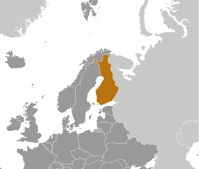#17,562
Yesterday, after saying they were powerless to regulate fur farms affected by avian flu, the Finnish Food Authority (Ruokavirasto) announced rule changes that would give them jurisdiction (see Finland: Food Authority Orders More Measures To Combat Avian Flu) over those facilities.With the number of premises affected by avian flu growing, and the number of fur-bearing animals susceptible now reportedly having risen from 5,000 last week to nearly 120,000 today (see WAHIS report), we are seeing a much more proactive stance being taken by their food safety agency (Ruokavirasto).
Today they announced the immediate imposition of a Bird Flu Infection Zone, covering 5 provinces.
(translation)
The Finnish Food Agency establishes an infection zone due to bird flu
July 20, 2023
In Finland, in June-July 2023, highly pathogenic bird flu of the H5N1 type has been detected in several localities. The disease has been found especially in seagulls. In addition, the disease caused by the virus has been found in farmed fur animals in Southern and Central Ostrobothnia. Currently, the infection has been confirmed on ten fur farms. Investigations are still ongoing.
Pursuant to the Animal Diseases Act, the Finnish Food Agency establishes an infection zone with the aim of preventing further spread of the disease. The infection zone covers the provinces of Varsinais-Suomen, Satakunta, South Ostrobothnia, Ostrobothnia and Central Ostrobothnia. The decision is effective immediately.
It is forbidden to keep poultry and captive birds outside in the infected zone. The ban also applies to venues engaged in organic production. Exceptions can be found in the decision.
Measures to be taken in the infection zone to prevent the spread of infection
The infection zone is abolished when the Food Agency assesses that there is no longer a need for it to prevent the spread of bird flu. The Food Agency also informs separately about the termination of the zone.
- Visits by persons to the animal shelter for poultry and captive birds are prohibited for reasons other than essential.
- Persons visiting an animal shelter for poultry or captive birds must wear only the protective clothing used in that animal shelter, and change footwear when entering and exiting the animal shelter. In addition, hands must be washed and disinfected when entering the animal shelter. If it is not possible to wash your hands, you must still disinfect your hands.
- Bird feeds and bedding must be stored so that wild birds cannot come into contact with them.
The Food Agency recommends that poultry be carefully protected in other parts of the country as well. If symptoms suggestive of bird flu, abnormal mortality or changes in production are observed in poultry or other birds, the municipal or county veterinarian must be notified immediately. A decrease in water and feed consumption or egg production can be signs of bird flu infection.
Mass deaths of wild birds and individual dead birds of prey must also be reported to the municipal or county veterinarian. The municipal veterinarian takes care of sending the necessary samples to the Helsinki office of the Food Agency.
Avian flu viruses are poorly contagious to humans, and infection usually requires close contact with an infected wild bird, poultry or their secretions.
More information:
Head of Unit Sirpa Kiviruusu, tel. 0400 920503.
E-mail: firstname.surname@ruokavirasto.fi
